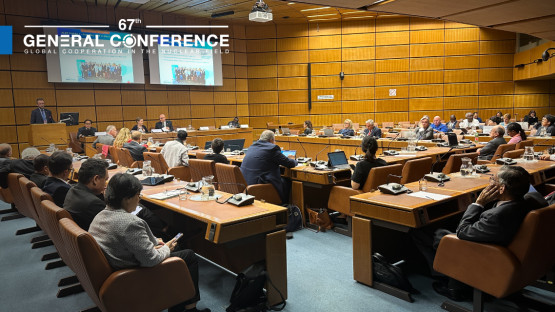International cooperation among nuclear safety regulators to assist new countries in developing nuclear power programmes and meet the challenges of new advanced nuclear reactor designs was top of the agenda for participants at the 2023 Regulatory Cooperation Forum (RCF) Plenary Meeting.
“International cooperation is vital for strengthening nuclear safety worldwide, and one of the added values of the RCF is to enable the RCF members to exchange information among regulators in diversified directions — for example, advanced recipients to other recipients, providers to providers,” said Lydie Evrard, IAEA Deputy Director General and Head of the Department of Nuclear Safety and Security in her opening remarks to the meeting.
Evrard emphasized the IAEA’s commitment to further strengthen international cooperation, through varied modalities, such as development of documents; information sharing meetings; and peer review missions. She expressed appreciation for the providers and advanced embarking countries for their valuable support for the RCF. Introductory presentations from Michal Koc, National Atomic Energy Agency, Poland and Emmanuel Ampomah-Amoako, Nuclear Regulatory Authority, Ghana described how RCF support had helped facilitate bilateral assistance for the development of regulatory infrastructure in those countries. These included the implementation of “Advanced Licensing Exercise Project (ALEP)” from the United States to Poland which assists its capacity building for regulatory review and assessment, and the initiation of the “European Instrument for International Nuclear Safety Cooperation (INSC)” from the European Commission to Ghana. This is intended to assist in areas such as the development of an integrated management system and human resource management in Ghana.
Construction of Poland’s first nuclear power plant is planned to begin in 2026, and the country plans to build six reactors in the country by 2040. Ghana is also planning to add nuclear power to its energy mix to enhance economic development and provide a stable and affordable supply of electricity to its people.
Two consecutive panel discussions examined new strategic priorities for the RCF: the first discussed how to coordinate RCF activities with other networks for nuclear safety for enhanced effectiveness. The panel included presentations from the Technical and Scientific Support Organization Forum (TSOF), the Small Modular Reactor (SMR) Regulators' Forum, the Global Nuclear Safety and Security Network (GNSSN) and the Forum of Nuclear Regulatory Bodies in Africa (FNRBA).
Advanced nuclear power reactor designs, including SMRs are expected to play a crucial role in meeting the twin goals of increasing access to electricity and powering economies while minimizing greenhouse gas emissions. However, novel approaches to their design and deployment pose challenges to the existing regulatory framework.
Ramzi Jammal, chair of this panel and RCF Chair, said that “the RCF is now trying to enhance its coordination functions through increased transparency of bilateral and international assistance to the recipient countries among RCF members. The coordination with other networks for nuclear safety can further strengthen and optimize international cooperation for achieving a high level of safety in the safe deployment of innovative technologies such as SMRs”.
The second panel discussion, which included presentations from RCF members Finland, Ghana, and the United Arab Emirates, examined lessons learned and members’ expectations from the RCF.
Faizan Mansoor, Chair of this panel and RCF Vice-Chair, said, that “the added value of the RCF is confirmed with the introduction of members’ successful experiences, which can be the initiative for expanding the forum to non-RCF members.”
In these panels, the meeting heard about the results of a comprehensive survey conducted to assess the programme. The Evaluation Report on the comprehensive survey found strong support for the RCF in its role of facilitating and coordinating support for regulatory infrastructure development, and suggested areas for enhancement, which were discussed during the panel.
Anna Hajduk Bradford, Director of the Division of Nuclear Installation Safety, commended the RCF on the comprehensive survey conducted to assess further improvement of its programme. “The IAEA will implement the proposed actions as RCF Secretariat, for example, transparency of the RCF to non-RCF members and more coordination and cooperation with other networks such as the SMR Regulators Forum”.
The RCF was founded in 2010 as a member-driven forum of nuclear safety regulators. The Forum has long served as a platform for the sharing of regulatory knowledge and experience through international cooperation with the goal of achieving a high level of nuclear safety that is consistent with the IAEA safety standards. At this meeting, RCF members, who include both representatives from countries with advanced nuclear power programmes and countries that are planning to expand or introduce the use of nuclear power, discussed how to enhance the strategic value of the RCF for its members, and ensure that it continues to offer best value.







